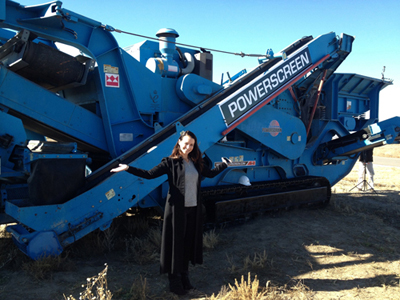
US federal officials have used a
The disposal at the US Fish and Wildlife Service’s National Wildlife Property Repository at Rocky Mountain Arsenal National Wildlife Refuge near Denver, Colorado, was attended by representatives of African nations and other countries; dozens of leading conservationists and international media representatives. This was the latest in a series of actions by the US government designed to crack down on international poaching and illegal wildlife trafficking.
“Rising demand for ivory is fuelling a renewed and horrific slaughter of elephants in Africa, threatening remaining populations across the continent,” said Secretary of the Interior Sally Jewell.
“We will continue to work aggressively with the Department of Justice and law enforcement agencies around the world to investigate, arrest and prosecute criminals who traffic in ivory. We encourage other nations to join us in destroying confiscated ivory stockpiles and taking other actions to combat wildlife crime.”
The international trade of ivory was banned in 1989 under the Convention on International Trade in Endangered Species of Wild Fauna and Flora (CITES) and during the past 24 years the United States government has stockpiled tonnes of confiscated items. The Ivory Crush was part of a plan put in place following the signing of an executive order by President Barack Obama in July 2013. The initiative called for a new task force to address the issue of trafficking and allocated $10 million to aid Africa's efforts to beat poaching and the illegal trade of wildlife products, which are putting elephants under increasing danger of extinction.
“By crushing its contraband ivory tusks and trinkets, the US government sends a signal that it will not tolerate the senseless killing of elephants. Other countries need to join the United States, Gabon, Kenya and the Philippines to take a stand,” commented Carter Roberts, President and CEO of World Wildlife Fund.
In other countries, a variety of methods have been used to try to destroy ivory products including burning and flat rolling. For the Ivory Crush event, a Powerscreen crusher was selected for its capability to reduce the tusks, ornaments and jewellery to a specific size. Given the specialist nature of the application and the required crushed product size of less than ¾”, careful consideration had to be given to the machine selection and configuration. The Powerscreen impact crusher at the event featured a recirculating conveyor ensuring that any material that wasn't crushed to specification after a first crush, was passed back through the crusher chamber again.
Todd Goss, General Manager of Powerscreen’s North American facility, said: “Having been able to be part of something so important underlines Powerscreen’s commitment to meeting our customers’ requirements, from a quarry crushing rock to a contractor processing C&D waste or as in this Case, the US government crushing elephant ivory.”






